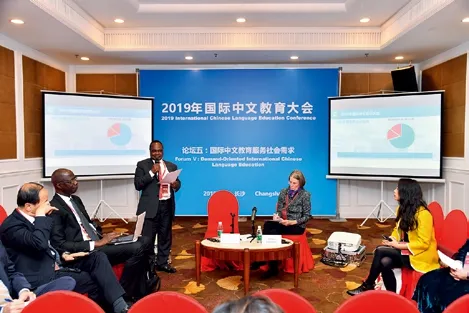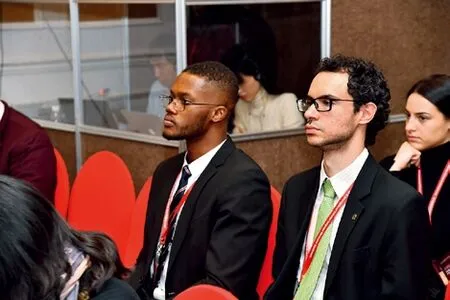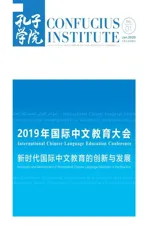国际中文教育服务社会需求
2020-04-22
来自美国、英国、巴西等21 个国家的22 名代表做发言,现场约800 名代表参与了讨论。
工作坊1. 中文教育与复合型人才培养
英国赫尔大学孔子学院院长Marina Mozzon-McPherson介绍了该孔院Chinese Whispers 通过学唱歌曲教授中文的探索,目前参与该项目的学员已成功举办中西方歌曲演奏音乐会,广受好评,同时已有3 名博士生正通过该项目开展中文教学研究,探索将该模式应用到更广阔领域。塞内加尔达喀尔大学孔子学院院长Mamadou Fall 表示,达喀尔大学孔院与达喀尔大学历史学院、哲学系及社会学系等合作开展特色课程和讲座,满足了学校对中文和中国文化教育日益增长的需求。日本爱知大学教授刘柏林提到,爱知大学充分利用孔院平台,与中方合作院校南开大学开展稳定的校际交流合作,效果显著,并大大改善了日本学生对中国的刻板印象,增进了中日两国青少年间友谊和相互理解。
埃及苏伊士运河大学孔院中方院长朱廷婷介绍,该孔院发掘当地中资企业对“中文+职业技术”人才的需求,开展了中文与专业技能相结合的教学模式,满足当地企业需求的同时,帮助学生开拓就业途径,促进当地就业率的提升,但该项目目前面临缺乏“中文+职业技术”专业师资的困难。泰国孔敬大学孔子学院中方院长胡琳表示,孔院“中文教育+铁路技术”的人才培养班已开办四届,培养了近200 名学生。2018 年起,孔院将该模式扩展到机电、信息技术、物流管理等领域。此外,孔院积极搭建平台,联合中泰方69 所职业院校建立“中泰职业教育联盟”,并开设多门职业中文在线课程。美国纽约州立大学眼视光学院孔子学院院长Guilherme Albieri 与肯尼亚内罗毕大学代理校长Mbeche Isaac Meroka 也分别表示,中文为学生提供了更多的就业选择和更高的就业平台。
工作坊2. 中文教育与学生创业就业
智利圣托马斯大学孔子学院开展的一项调研结果显示,78%的学生学习中文是为了寻求更好的职业发展。
美国新罕布什尔大学孔子学院院长王亦歌提出,设立中文专业或辅修专业,提升教学专业化程度是提升中文教学质量的重要途径。德国法兰克福大学孔子学院院长王魏萌介绍,法兰克福大学提供中文教学资格认证课程,使学生在学习中文,提升语言能力的同时,也能够提升中文教学水平,帮助其日后成为中文教师。
新加坡南洋理工大学教授吴英成和加拿大卡尔顿大学孔子学院院长李征分别介绍了“中文+对外贸易专业能力”和“中文+中国营商环境+电子商务”的培养模式,指出同时掌握中文和专业知识对学生创业、就业的重要性。
美国新罕布什尔大学和智利圣托马斯大学孔子学院通过调研学生学习中文的目标,有的放矢开展教学,帮助学生逐步实现学习目标。智利圣托马斯大学孔子学院院长Lilian Espinoza 表示,孔子学院至今已输送50 名学生赴中国多所高校学习深造, 80%的学生通过学习中文找到了理想的工作,他们中的一些人成为了孔子学院各教学点的教师。
工作坊3. 中文教育与中外经贸合作
塞尔维亚贝尔格莱德孔子学院介绍其为塞尔维亚本土员工开设中文培训班,为中方管理人员开设塞尔维亚语课程,并与塞尔维亚河北钢铁公司合作举办出版座谈会、中塞文化讲座等高端文化活动。塞尔维亚河北钢铁公司则提供教学设备、资金等支持。黑山大学孔子学院为中国路桥黑山分公司、尼克希奇工业园等企业开设中文课程, 合作培养中文人才、举办文化活动。中国路桥黑山分公司为孔院学生提供就业岗位,为孔院活动提供经费、人员支持;尼克希奇工业园在园区内免费为孔子学院提供专门场地,并在重要活动、媒体采访时积极宣传介绍孔子学院。斯洛文尼亚卢布尔雅那大学孔子学院开设了“如何与中国做生意”“商务中文”等商务相关学分课程和在线网络教学平台。除商务中文教学外,孔子学院还为当地企业量身定制培训课程等。
塞尔维亚贝尔格莱德孔子学院院长普西奇表示,中资企业在海外的管理人员虽然能用英语进行对话,但并不能实现顺畅的沟通,原因就在于不了解对方的文化。他还提出,希望在海外长期发展的中资企业制定长远的规划,培养既懂中文又懂专业的复合型人才,这需要企业长期投入,以及两国政府层面的重视和支持。比利时西弗兰德大学学院孔子学院院长冯浩烈(Philip Vanhaelemeersch)表示中文人才对于想与中国做生意的企业有很大作用,但企业需要的往往不仅仅是翻译人员,还要懂专业方面的词汇和语言,孔子学院可以在这方面做出更大贡献。
英国伦敦商务孔子学院为企业人力资源主管进行语言文化培训,为学生提供与中国相关的实习机会,提供中国文化沉浸式体验,利用校友会进行资源分享等。日本爱知大学孔子学院充分发挥爱知县拥有以丰田汽车公司为首的众多汽车相关企业和大学有中国研究基础,以及中方合作院校南开大学在经济金融专业实力雄厚等优势,通过开设商务课程、举办中日企业家高峰论坛等,现已拥有了稳定的目标受众群。克罗地亚萨格勒布大学孔子学院尤拉克(Kresimir Jurak)提出,要充分利用中外方合作院校资源,为学生提供更多赴中国实习的机会和项目,以便其更加深入了解中国文化。中国上海对外经贸大学承办的3 所孔子学院充分发挥承办院校经贸方面的专业优势,积极促进中外经贸合作,其中斯洛文尼亚卢布尔雅那大学孔子学院注重打造商务孔子学院,克罗地亚萨格勒布大学孔子学院注重旅游与商贸、斯洛伐克考门斯基大学孔子学院注重学术与经贸。该校还成立了中东欧研究中心、一带一路研究院、南亚研究院等科研机构,并与中东欧国家及其他“一带一路”国家开展教师往来、学生互派、科研合作等全方位的交流与合作。
工作坊4. 中文教育与文化多元发展
澳大利亚昆士兰大学孔子学院中方院长梁煜以孔子学院举办的“中国春节游行”“亚洲节”等活动为例进行了分享。中文教学与文化活动应相辅相成,互为助力,如在中文课程中适当加入文化元素,增加课堂趣味性;在文化活动中则穿插中文知识点,寓教于乐,事半功倍。韩国顺天乡大学孔子学院中方院长李忠辉通过展示孔子学院举办的“影视中文配音”“中国知识杯竞赛”及“华风汉艺”等活动,对此进行了说明。
此外,还可考虑统筹出版更多适应不同文化的中文教材和读物,使学生能够在学习中文的同时,了解多元文化。应充分利用多媒体及现代教育技术手段,开设“中文+文化”的新型网络课程,以便更多人学习。
不同国家或地区孔子学院可根据实际需求深化跨区域交流与合作,联合举办大型活动,促进文化多元发展。
22 representatives from 21 countries like the US, Britain and Brazil made statements on the forum. Around 800 representatives participated in the discussion.
Workshop 1. Chinese Language Education and Versatile Talent Cultivation

Marina Mozzon-McPherson, Director of the Confucius Institute at the University of Hull in UK, introduced their exploration in teaching Chinese through learning and singing Chinese songs in the Chinese Whispers. At present, students participating in the program have successfully held the widely-praised Chinese and Western song concert. Meanwhile 3 doctoral students are doing Chinese language education and research through the program and exploring to apply the mode into a wider field. Mamadou Fall, Director of the Confucius Institute at the University of Dakar in Senegal, stated that the Confucius Institute has cooperated with other schools of the university, such as the schools of history, philosophy and sociology to carry out special courses and lectures, which satisfied the increasing demands for Chinese language and China’s culture education of the university. Liu Bolin, the professor from Aichi University said the university has made full use of the Confucius Institute and performed steady inter-university communication and cooperation with its partner university in China, Nankai University, which has gained evident effects,improved the stereotype that Japanese students have on China,and enhanced the friendship and mutual understanding between Chinese and Japanese teenagers.
Zhu Yanting, Director of the Confucius Institute at Suez Canal University in Egypt, introduced that the Institute has found the demands of local China-invested enterprises on“Chinese + Vocational Skills” talents, started the educational mode of Chinese language plus technical skills, which satisfied the demands of local enterprises and helped students to expand employment opportunities and enhanced local employment rate. But the program does not have enough teachers. Hu Lin, Director of the Confucius Institute at Khon Kaen University in Thailand, said that the Institute has applied the “Chinese Education + Railway Technology” to cultivate talents for 4 years and cultivated nearly 200 students. Since 2018, the mode has been extended to mechatronics, information technology and logistic management etc. What’s more,the Institute has actively built up platforms by uniting 69 vocational colleges in both China and Thailand to establish the China and Thailand Vocational Education Alliance and set up multiple online vocational Chinese courses. Guilherme Albieri, Director of the Confucius Institute at SUNY College of Optometry, and Mbeche Isaac Meroka, the acting president of the University of Nairobi in Kenya, pointed out that Chinese language has provided more employment opportunities and better employment platforms for students.
Workshop 2. Chinese Language Education and Student Entrepreneurship and Employment
An investigation and survey conducted by the Confucius Institute at St. Thomas University in Chile indicates that 78%of students learn Chinese language to seek better career development.
Wang Yige, Director of the Confucius Institute at the University of New Hampshire in America, brought up that it is an important way of enhancing Chinese language education by setting the Chinese language or auxiliary courses to promote the degree of specialization. Wang Weimeng, Director of the Confucius Institute at Goethe University Frankfurt in Germany, introduced that the university has offered Chinese language teaching qualification authentication courses, so that students could learn Chinese language and enhance language skills and meanwhile enhance Chinese language teaching capability to help themselves become Chinese language teachers in the future.
Wu Yingcheng, the professor of Nanyang Technological University and Li Zheng, Director of the Confucius Institute at Carleton University separately introduced the development modes of “Chinese + Foreign Trade” and “Chinese + Business Environment in China + E-commerce” and meanwhile pointed out the importance of mastering Chinese language and technical skills to students’ entrepreneurship and employment.
The Confucius Institutes at the University of New Hampshire and St. Thomas University researches the students’aims for learning Chinese language, and teaches in accordance with those aims and helps students to realize their learning aims gradually. Lilian Espinoza, Director of the Confucius Institute at St. Thomas University said that the Institute has sent 50 students to Chinese colleges and universities by far. 80%of the students have found an ideal job by learning Chinese language and some of them become teachers at the teaching sites of the Confucius Institute.

Workshop 3. Chinese Language Education and China-Foreign Economic and Trade Cooperation
The Confucius Institute in Belgrade, Serbia introduced that it sets up Chinese language training classes for local employees and Serbian language courses for Chinese management staff. The Institute has held publication forum, Chinese-Serbia culture lectures and other high-end cultural activities in cooperation with Serbia Hebei Iron and Steel Company.Serbia Hebei Iron and Steel Company provide teaching equipment, fund and other supports. The Confucius Institute at the University of Montenegro set up Chinese language courses for the China Road and Bridge Corporation (CRBC) Montenegro Branch and Niksic Industrial Park and other enterprises. They cultivate Chinese language talents and host cultural activities.The China Road and Bridge Corporation (CRBC) Montenegro Branch offers the students in the Confucius Institute job opportunities, fund, and staff for the Confucius Institute’s activities. The Niksic Industrial Park provides the Confucius Institute with special sites for free and actively promotes the Confucius Institute in important events and media interviews.The Confucius Institute at the University of Ljubljana sets up How to Do Business with China, Business Chinese and other business-related courses as well as online network education platforms. Besides business-related Chinese language teaching, the Confucius Institute also customizes training courses and provides practical skill training for local enterprises.
Puši Radosav, Director of the Confucius Institute in Belgrade, Serbia, said that overseas management personnel of China-invested enterprises are able to speak English, but the communication is not smooth and the reason is that they do not understand the culture of its counterpart. He hoped that China-invested enterprises seeking for long-term overseas development should make forward-looking programs to cultivate versatile talents who understand Chinese language and technical expertise. It needs long-term input by the enterprises as well as attention and support from the government of both countries. Philip Vanhaelemeersch, Director of the Confucius Institute at the University College of West Flanders in Belgium, said that Chinese-speaking talents are important for enterprises willing to do business with China. But enterprises usually need not only translators, but also talents mastering technical terms and language at the same time. The Confucius Institute can make great contributions in this respect.
The Confucius Institute for Business London provides enterprise human resource managers with language and culture training with immersive experience of China’s culture, and uses alumni association to share resources etc. The Confucius Institute at Aichi University makes full use of the tremendous advantages of the research basis on China funded by the many vehicle enterprises in Aichi-ken including Toyota and universities and the excellent finance specialty of the Institute’s Chinese partner Nankai University. The Confucius Institute at Aichi University sets up commercial courses and holds the China-Japan entrepreneur summit and other bull sessions, which brings in steady audiences. Kresimir Jurak from the Confucius Institute at the Zagreb University in Croatia put forward that resources of partner universities from home and abroad should be fully used to provide students more opportunities and programs to have more internship in China so that they could learn China’s culture in depth. The three Confucius Institutes built by Shanghai University of International Business and Economics give full play to their advantages in economy and trade, actively promote economy and trade cooperation between China and other countries. The Confucius Institute at the University of Ljubljana in Slovenia focuses on building the business Confucius Institute, the Confucius Institute at the University of Zagreb in Croatia lays importance in tourism and trade, and the Confucius Institute at Comenius University in Slovakia attaches importance to academy as well as economy and trade respectively. Shanghai University of International Business and Economics also establishes the Central and Eastern Europe Research Center, the Belt and Road Research Institute and South Asia Research Center as well as other scientific research institutions. And it also carries out comprehensive communication and cooperation with central and eastern European countries and other countries along the Belt and Road, such as teacher and student exchange and scientific research cooperation.


Workshop 4. Chinese Language Education and Diverse Cultural Development
Liang Yu, Director of the Confucius Institute at the University of Queensland in Australia, shared their activities such as the Chinese Spring Festival Parade and Asia Festival etc.
Chinese language teaching and culture activities can complement each other. For example, cultural elements are added in Chinese language courses to enhance the fun in the class. Cultural activities are interspersed with Chinese language knowledge points. Teaching purpose is realized in fun and half work makes double results. Li Zhonghui, Director of the Confucius Institute at Soonchunhyang University in South Korea, shared their experience by showcasing their activities such as the Chinese film dubbing, the Chinese knowledge cup competition and the Chinese style and Han art.
Besides, it should be considered to publish more Chinese language textbooks and reading materials that fit in various cultures, so that students can learn Chinese language and diverse cultures. Multimedia and modern education technology should be applied to build up new online courses of “Chinese+ Culture” for the convenience of more people.
Confucius Institutes in various countries or districts can deepen cross-district communication and cooperation according to the actual demands, jointly host large-scale events and promote multicultural development.
